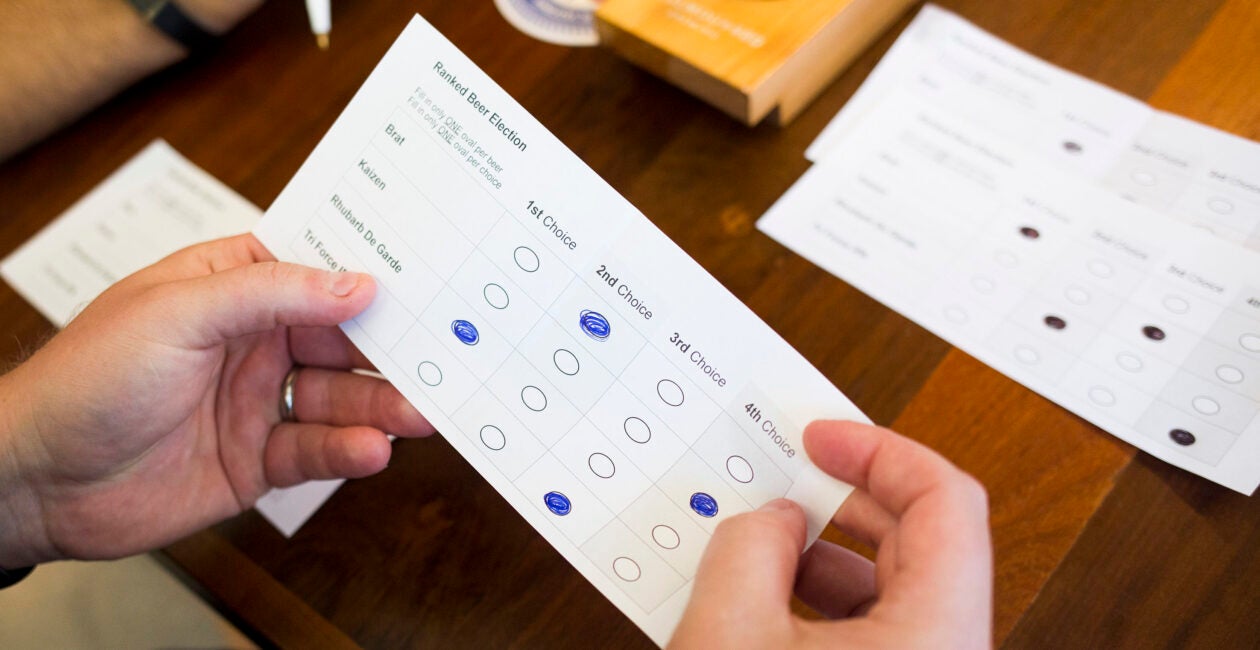 |
| Brianna Soukup/Portland Press Herald/Getty |
Proponents of overhauling elections to allow voters to have a backup plan if their candidate doesn’t win went 1-1 at the state level in the 2020 election, but are looking to change how elections work in other states.
More than 30 bills on ranked-choice voting have been proposed in state legislatures across the country, according to Fair Vote, the nonprofit group that is promoting the system nationally.
Ranked-choice voting is a system that allows voters to rank a first, second, and third choice, or more. A voter casting a ranked-choice ballot, for example, might select three candidates in order of preference out of six candidates for a congressional seat.
Proponents say ranked-choice voting is a moderating force and superior because it means voters don’t have to settle for the lesser of two evils. Opponents say the system is problematic because it is confusing to voters and can lead to outcomes where the candidate winning the most votes loses the election.
The effort to promote ranked-choice voting largely has been financed by a liberal donor who is the daughter-in-law of media mogul Rupert Murdoch.
Before primary elections by popular vote in the 1900s, political parties generally used a similar winnowing process to choose potential nominees until one candidate achieved majority support, said Rob Richie, CEO of Fair Vote, a leading organization that advocates ranked-choice voting.
In the Progressive Era, beginning in 1890, states began adopting regulations for primaries to nominate candidates, instead of having party bosses do so at conventions or caucuses. By 1917, all but four states had adopted some form of primaries. The first primary at the presidential level was in 1912.

“Candidates will talk to more voters if they know there is a second or third choice on the ballot,” Richie told The Daily Signal. “They will walk past their opponents’ yard sign and still knock on the door and get to know the voter.”
Protect My Ballot, a coalition of state think tanks opposed to ranked-choice voting, includes the Maine Policy Institute, the Alaska Policy Forum, the Fiscal Alliance Foundation, the Oklahoma Council of Public Affairs, and the Freedom Foundation of Minnesota.
“Americans of all political backgrounds have rejected ranked-choice voting as a confusing scheme that makes it more difficult to exercise your right to a vote that counts,” Rebekah Paxton, director of research and coalitions at the Employment Policies Institute, which launched Protect My Ballot, told The Daily Signal.
“Studies show that [ranked-choice voting] disenfranchises voters and reduces turnout, while its proponents’ promises remain largely unfulfilled in practice,” Paxton said.
Here are answers to key questions about ranked-choice voting and where it stands.
1. Who’s Bankrolling These Efforts? --->Read the rest of the story HERE
If you like what you see, please "Like" us on Facebook either here or here. Please follow us on Twitter here.

No comments:
Post a Comment